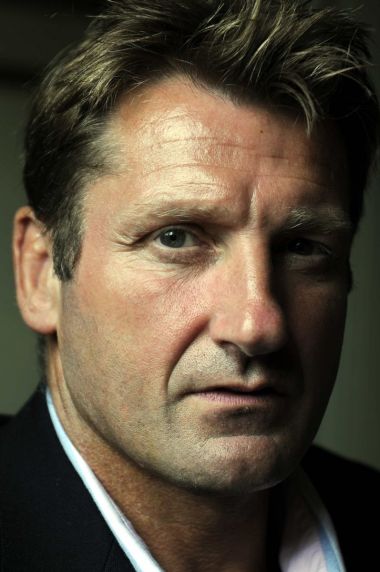
Lion
On August 17, 2013, Justyn Rees Larcombe became notorious as the man who had it all and spectacularly lost it.
The former Army major with a high-paying City job had become a gambling addict. He had lost most than three-quarters of a million pounds in three years, forfeiting his savings, his home and his family’s most valuable possessions, sold for a fraction of their worth. Worst of all, appalled by his deception, his wife Emma had left him, taking their two boys. While she later returned to give the marriage another go, it did not survive.
Justyn’s story, broken by the Daily Mail, is documented in the book Tails I Lose (Lion, £8.99). Now he’s written a follow-up, One Day at a Time: A Recovering Addict Shares Practical Wisdom. And while his first book was aimed at a general readership, this one goes into far more detail about the part played in his recovery by his faith in Christ.
As he says of his very lowest point: “Instead of taking my own life, I gave it back to the God I had known for much of my life. I had pushed him away through arrogance and pride when I found financial success in business. And so I discovered the end was just the beginning. The God of grace heard me when I cried out to him in desperation, and he restored my life in a very short time.”
He has been, to a large extent, restored, though he remains lastingly regretful about the failure of his marriage (his second) to Emma, and about the damage his behaviour did. However, out of his experience he has developed an extraordinary self-knowledge, portrayed in lacerating detail in One Day at a Time, and an ability, perhaps unique, to help others struggling with the same kind of issue.
Justyn was, after all, a highly successful, driven and competitive individual. It’s not surprising that he should retain those characteristics and turn them to good use – but it’s those very traits that he believes set him, and people like him, up for a fall.
Now 47, as well as writing insurance textbooks and marking exams (“boring, but it brings in an income”, he tells Christian Today) he leads training events on addiction recovery via Recovery Two, a Bible-based 12-step course. He also runs a consultancy aimed at organisations, and speaks in prisons and Premier-league Rugby clubs. That’s shortly to branch out to cricket too, and he has football in his sights. He understands these high-performing, well-paid sports stars because they’re like him – and he believes this personality type is one of the risk factors for addiction, of whatever kind. People like this, he says, are “full-on”: whatever they do, they do to the max. They like risk, they’re optimists and adrenaline junkies who find it difficult to come down from their highs. They also have easy access to money. And for sportspeople today, the risks from alcohol or other drugs are just too high – so gambling becomes the medication of choice.
Related
- ‘Living hell’ of poverty is driving Brits to suicide, Christian debt charity warns
- 6 simple ways Christians can make social media better
- New research suggests prayer helps reduce addiction
- Pressure mounts on government to clamp down on ‘toxic’ gambling machines
- US campaigners: Porn is ‘public health hazard’
So, he says, they listen to him. “I’m not qualified to talk to them in any way apart from my experience. When I talk to a rugby team it makes everything come alive. When I go in and tell my story I can be really honest.”
He’s at pains to stress that having this kind of personality doesn’t automatically lead to addiction. It’s one possessed by many high-achieving people who channel their abilities into positive actions. And it’s not the only risk factor, either. He’s open to the possibility some people are genetically predisposed to some forms of addiction, like alcoholism. And for others addiction is kick-started by a trigger factor; in the case of a rugby player, this might be injury or the end of a career.
For himself, he says, it may have been an experience from his early teenage years. His father woke him one night to say that his mother – author Jennifer Rees-Larcombe – was gravely ill and expected to die. He says: “My mother didn’t die, but that night I glimpsed the fragility of life. I came to understand that what I had so innocently taken for granted could leave at any stage. The ones we love the most could abandon us, either deliberately or by misfortune.”
He believes that left a wound that made him vulnerable. He says: “I plead with those who have to watch loved ones self-destruct, to understand that we use our habits and compulsions to medicate the pain that we all carry with us into adulthood.”
Whatever the cause, addiction can ruin lives. In One Day at a Time he writes of his own gambling problem, but he also has chapters on alcohol, pornography, eating disorders, buying disorders – “financial addictions” – and social media. All of them can warp a personality and lead to broken relationships and ruined lives.
How can addiction be beaten? He offers two tracks, not mutually exclusive but very different. One is accountability. “If you are worried that perhaps you’re getting to the stage where you’re losing control and failing to meet the limits you’ve set yourself, talk to someone you trust.” He suggests setting up a weekly meeting. “That works particularly well with pornography. You have to look someone in the eye and either you lie to them, in which case there’s no point in the meeting, or you tell them the truth, and it’s either great news or it’s painful.”
But his own experience of addiction was not just of control, but of something deeper, brought about by Christ himself. At his lowest point he went home to his mother. And there, he says, “God fixed me on the inside. Other addiction therapies are like sticking-plaster. Christ-based recovery is so powerful. When Christ comes into our hearts he heals us on the inside, with the knowledge that we’re loved by him whatever we do. I have seen that so many times.”
As he puts it in the book: “If we allow Christ to deal with our inner pain, it reduces or eliminates our emotional need to medicate. With our emotions dealt with, our habits become purely physical issues which can be dealt with by way of a few techniques like knowing and avoiding triggers and putting in blocks.”
One Day at a Time is framed by a cross-Channel swim Justyn undertook. The mental and physical suffering he underwent becomes a metaphor for his harder journey through addiction. He says: “We all have our own journeys to follow, and Christ has a path for each of us.” He has no idea where his own will lead, but he has hope, and faith. And he doesn’t gamble any more. “If I made one slip, I’d risk everything.”
He’s already lost enough – but God is restoring him, one day at a time.
Email Justyn Rees Larcombe at info@recoverytwo.co.uk
Visit http://www.recoverytwo.org/ for details of the recovery course conference.


